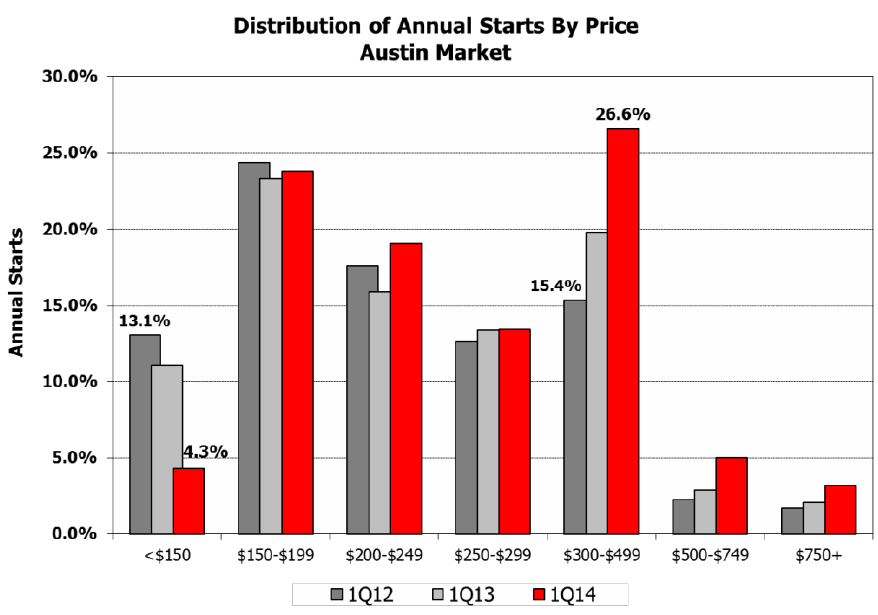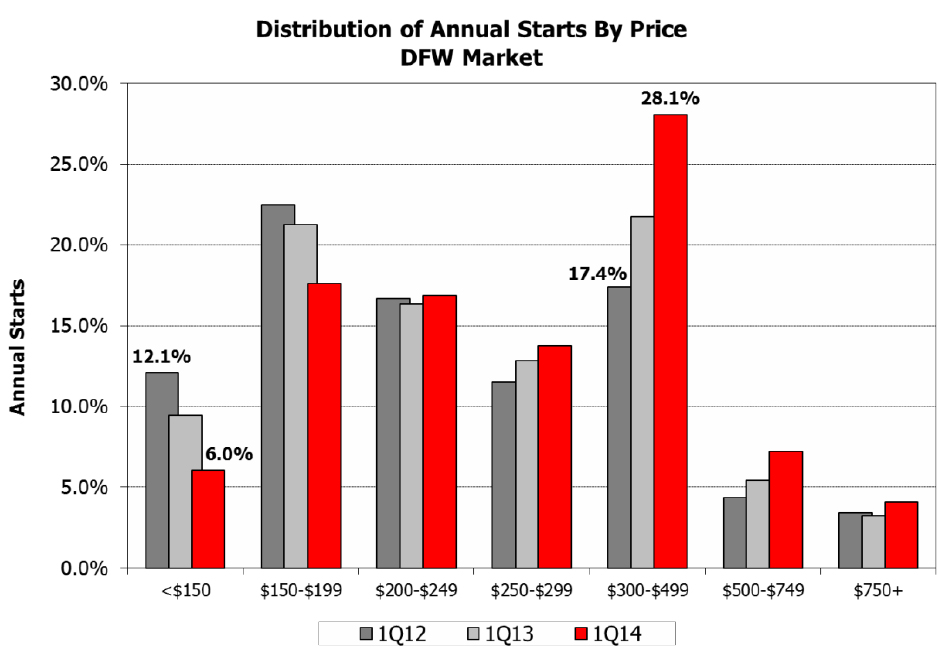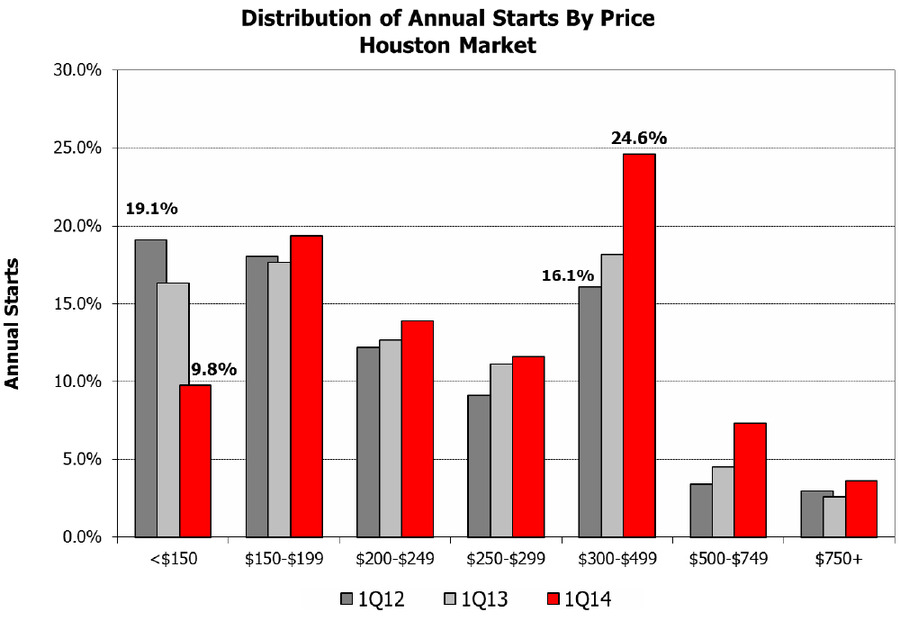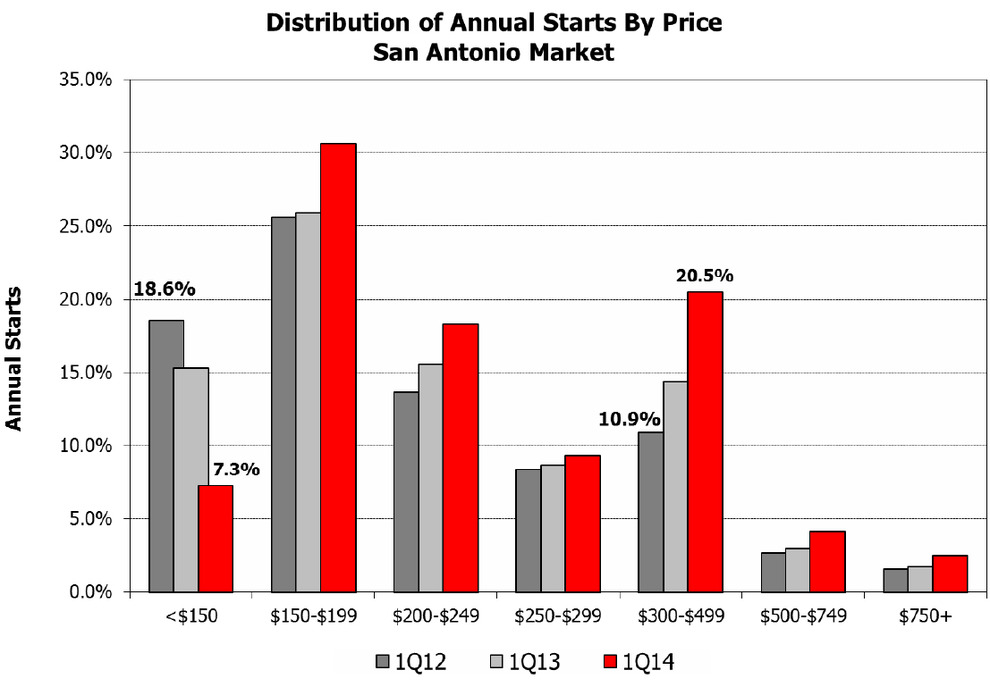The WPJ
THE WORLD PROPERTY JOURNALReal Estate Facts Not Fiction
Residential Real Estate News

The Coming Texas Housing Affordability Squeeze
Residential News » North America Residential News Edition | By WPJ Staff | July 1, 2014 11:23 AM ET
According to Metrostudy's first quarter 2014 survey of the Texas Housing market, first time and lower income buyers are getting priced out of the market.
Texas right now is home to the strongest housing markets in the entire country. Texas was on a different cycle long before the boom and the bust came along. Driven by past swings in oil prices, the state was already on a rapid-growth trajectory before the rest of the country went on its early-2000s building binge. Said colloquially, when Phoenix and Las Vegas caught pneumonia, Houston sneezed and kept on going, right to the top of the national market list.
The impact of the fracking revolution cannot be understated. With oil prices well above the $75 per barrel threshold of profitability, the energy sector has been supercharged, and this has fed the growth of housing demand. Houston has been the main beneficiary of this, but the entire state has felt the heady effects. The impact of the energy boom has been felt in all businesses in Texas.
"As strong as the Texas markets are, there is one thing missing: a strong first-time home buyer segment," said Metrostudy's Chief Economist Brad Hunter.
In all four housing markets in Texas, developers and builders are shifting away from affordable or "entry-level" product towards higher priced "move-up" housing. There are a number of factors that have contributed to this shift, but they all come back to margins.
"The costs of nearly every input including land, materials, and labor have seen sharp increases during the housing recovery. In order to mitigate these increased costs, builders have chosen to construct more homes at higher price points (and fewer at lower price points) in an effort to maintain their profit margins. In addition, the scarcity of housing product in many Texas markets has increased prices that builders are able to charge home buyers for the same product. As a result, the quantity (and proportion) of homes built priced less than $150,000 has dropped dramatically during the last three years.
In Austin, during the four quarters ending 1Q12, 13.3% of all new housing starts were priced less than $150,000. By 1Q13 that percentage had decreased to 11.1% of annual starts, and as of 1Q14 only 4.3% of annual starts in Austin were priced under $150,000. During that same period, starts on homes priced greater than $300,000 grew from 22.2% to 36.4%.

"As more builders focus their product to the buyer from $300,000 to $500,000, others are employing creative solutions to bring product to market that is more in-line with the historical pricing trends in Austin. Some of these tactics include introducing the detached condo product, entering new submarkets, or even expanding the range of gentrification. Austin continues to expand the heart of its new home market while these creative solutions add diversity to the market's housing mix," said Madison Inselmann, Regional Director of Metrostudy's Austin market.
In Dallas/Ft. Worth, 12.1% of annual starts were priced below $150,000 as of 1Q12. That proportion has decreased to 6.0% as of 1Q14. During the same period, starts of homes priced greater than $300,000 grew from 28.6% to 4.

"New homes priced under $150,000 are rapidly disappearing from the market because of shrinking lot inventory, rising land and construction costs. There are just over 5,000 developed lots available for home in this price range and they are not being replaced. Only 2% of the new lot deliveries in Dallas-Fort Worth last year were for homes priced under $200,000. Buyers searching for a new home in this price range are being pushed to the existing home market in most submarkets. They may soon be forced to stay in the rental market," said David Brown, Regional Director of Metrostudy's Dallas Ft. Worth Market.
In Houston, 19.1% of annual starts were priced below $150,000 as of 1Q12. That proportion dropped to 16.3% in 1Q13 and has since declined to only 9.8% as of 1Q14. Meanwhile, the proportion of home starts priced greater than $300,000 grew from 27.7% to 39.4%.

"Housing production is still struggling to catch up to burgeoning new-home demand, so more expansion is on the way. The pace of job relocations into Houston will be slower this year than the breakneck pace of 2013, but the influx of companies and workers will continue to support demand growth," said Brad Hunter, Metrostudy's Chief Economist.
In San Antonio, 18.6% of annual starts were priced less than $150,000 in 1Q12. Since then, this share has declined by 11.3% to only 7.3% of all annual starts as of our most recent survey. Builders in this market have increased the proportion of homes started in the "move-up" market over $300,000 from 18.7% in 1Q12 to 29.2% as of 1Q14.

"San Antonio has historically been one of the most affordable new home markets in the country. Recently it has become increasingly difficult to build a home priced below $150,000 in San Antonio," said Jack Inselmann, Regional Director of Metrostudy's San Antonio Market.
Combine this with the fact that incomes are not rising at the pace of rising housing costs, and the end result is buyers are being priced out of the market, effectively limiting the pace of housing growth. "This is not to say that San Antonio is not a healthy housing market, by any means, as indicators point to a market that should enjoy 8,000 to 9,000 home starts again in 2014," said Randall Allsup, Senior Consultant of Metrostudy's Texas market.
In all the Texas markets, the first-time homebuyers have been given less attention by many public builders, but we do anticipate a return of entry-level demand (and product that serves those buyers) in the next year, gaining even more momentum in 2015 and beyond. DR Horton and LGI are the tip of the spear for the entry-level right now, but we are expecting others to follow suit over the next few years. Continued momentum in labor markets will support more household formations (20-somethings moving back out of their parents' basements), and more reasonable mortgage requirements by the banks will help as well.
Sign Up Free | The WPJ Weekly Newsletter
Relevant real estate news.
Actionable market intelligence.
Right to your inbox every week.
Real Estate Listings Showcase
Related News Stories
Residential Real Estate Headlines
- More Americans Opting for Renting Over Homeownership in 2024
- BLOCKTITLE Global Property Tokenization Platform Announced
- Small Investors Quietly Reshaping the U.S. Housing Market in Late 2024
- Greater Miami Overall Residential Sales Dip 9 Percent in November
- U.S. Home Sales Enjoy Largest Annual Increase in 3 Years Post Presidential Election
- U.S. Housing Industry Reacts to the Federal Reserve's Late 2024 Rate Cut
- U.S. Home Builders Express Optimism for 2025
- Older Americans More Likely to Buy Disaster-Prone Homes
- NAR's 10 Top U.S. Housing Markets for 2025 Revealed
- U.S. Mortgage Delinquencies Continue to Rise in September
- U.S. Mortgage Rates Tick Down in Early December
- Post Trump Election, U.S. Homebuyer Sentiment Hits 3-Year High in November
- Global Listings Aims to Become the Future 'Amazon of Real Estate' Shopping Platform
- Greater Las Vegas Home Sales Jump 15 Percent in November
- Ultra Luxury Home Sales Globally Experience Slowdown in Q3
- World Property Exchange Announces Development Plan
- Hong Kong Housing Market to Reach Equilibrium in Late 2025
- Construction Job Openings in U.S. Down 40 Percent Annually in October
- U.S. Mortgage Applications Increase in Late October
- World Property Markets, World Property Media to Commence Industry Joint-Venture Funding Rounds in 2025
- New Home Sales Hit 2 Year Low in America
- U.S. Pending Home Sales Increase for Third Consecutive Month in October
- Pandemic-led Residential Rent Boom is Now Fizzling in the U.S.
- Emerging Global Real Estate Streamer WPC TV Expands Video Programming Lineup
- 1 in 5 Renters in America Entire Paycheck Used to Pay Monthly Rent in 2024
- U.S. Home Sales Jump 3.4 Percent in October
- Home Buyers Negotiation Power Grows Amid Cooling U.S. Market
- Canadian Home Sales Surge in October, Reaching a Two-Year High
- Greater Orlando Area Home Sales Continue to Slide in October
- U.S. Mortgage Credit Availability Increased in October
- U.S. Mortgage Rates Remain Stubbornly High Post Election, Rate Cuts
- Construction Input Prices Continue to Rise in October
- BETTER MLS: A New Agent and Broker Owned National Listings Platform Announced
- Home Prices Rise in 87 Percent of U.S. Metros in Q3
- Caribbean Islands Enjoying a New Era of Luxury Property Developments
- The World's First 'Global Listings Service' Announced
- Agent Commission Rates Continue to Slip Post NAR Settlement
- Market Share of First Time Home Buyers Hit Historic Low in U.S.
- Greater Palm Beach Area Residential Sales Drop 20 Percent Annually in September
- Mortgage Applications in U.S. Dip in Late October
Reader Poll
Marketplace Links
This website uses cookies to improve user experience. By using our website you consent in accordance with our Cookie Policy. Read More





